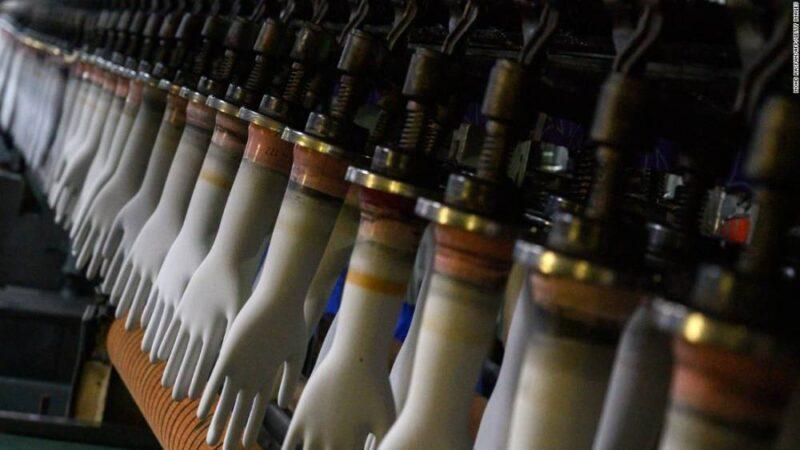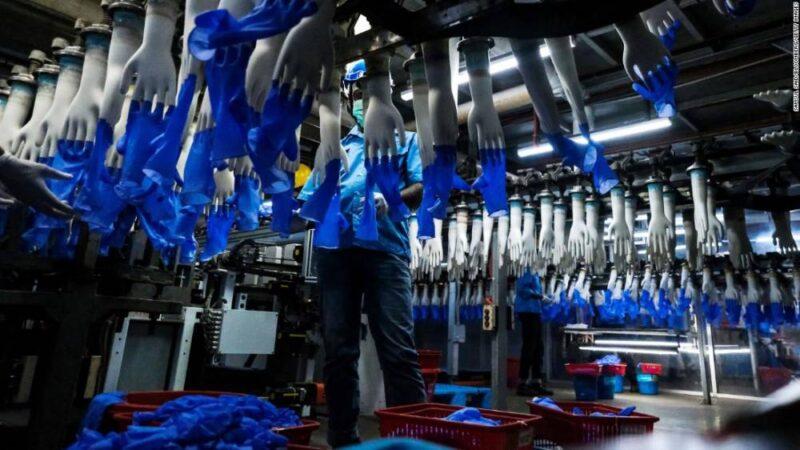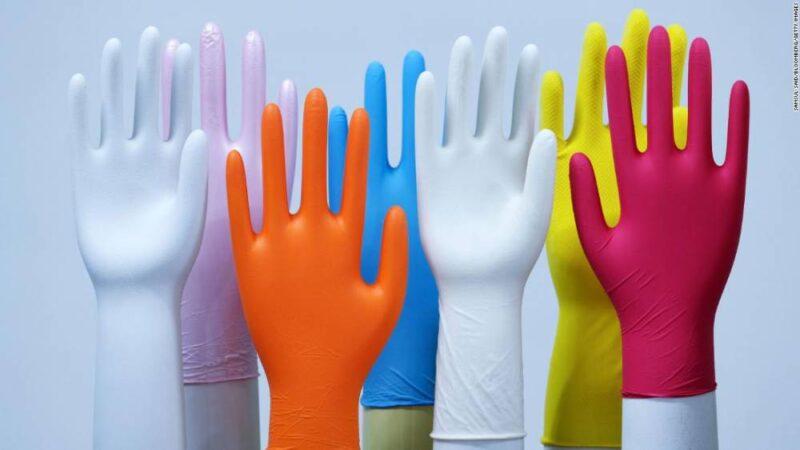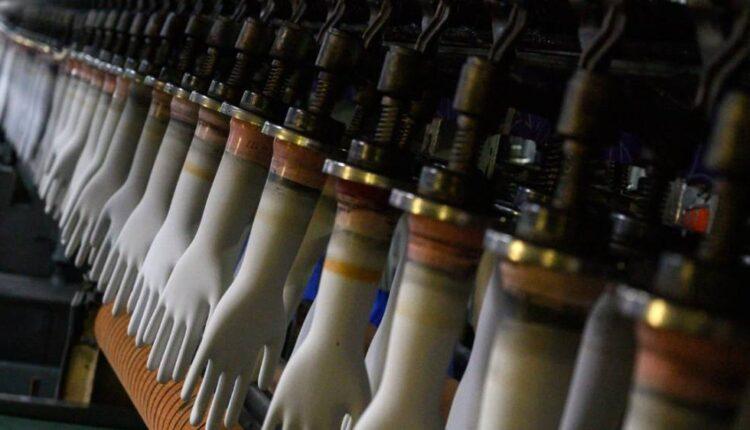The world’s top suppliers of disposable gloves are thriving because of the Covid-19 pandemic. Their workers aren’t
White molds wearing disposable gloves whizz by on a conveyor belt in a promotional video for the world’s biggest glove maker, Top Glove.
“Gloves can keep us out of harm’s way, wherever we may be and whatever we may be doing,” the narrator says, his voice booming over the company’s logo and its motto, “Top quality, top efficiency.” Demand for disposable gloves — the kind often associated with sterile hospital rooms — has surged during the coronavirus pandemic as health care workers rush to secure the supplies they need to treat the disease and protect themselves. The Malaysia-based Top Glove and its local rivals have benefited enormously from that need: Some 60% of the world’s glove supply comes from Malaysia, according to the Malaysian Rubber Glove Manufacturers Association (MARGMA). More than a third are exported to the United States, which for months has led the world in coronavirus cases and deaths. But with extra demand comes renewed scrutiny of how these Malaysian companies treat their workers, particularly foreign staff recruited from neighboring countries. Read MoreLabor rights activists who spoke to CNN Business said that practices reported by former workers contain elements of forced labor. Some authorities have taken note of such concerns, putting pressure on Top Glove and other manufacturers to ensure their workers are treated well.
In July, for example, the US Customs and Border Protection (CBP) agency barred products made by Top Glove and one of its subsidiaries, TG Medical, from being distributed in the country after finding “reasonable evidence” that the companies were using forced labor, according to an emailed statement. It said the evidence revealed alleged instances of “debt bondage, excessive overtime, retention of identification documents, and abusive working and living conditions.”Top Glove said in August that it was making good progress with authorities to resolve the issues. In a statement, the company said it had started reimbursing the recruitment fees foreign workers paid to agents who the offered them the job. Top Glove says it expects to repay a total of 53 million Malaysian ringgit ($12.7 million). A spokeswoman told CNN Friday that upgrades to foreign workers’ accommodation, as requested by US authorities, had been completed. But labor rights activists say the problems blighting Malaysia’s glove industry aren’t easily fixed. Concerns remain about the treatment of foreign workers in a rapidly growing industry, some of whom are enticed with the promise of high-paying jobs but are left saddled with debt.

Gloves on the production line at Top Glove’s factory in Shah Alam on the outskirts of Kuala Lumpur, August 26, 2020.
World’s glove factory
In recent decades Malaysia has emerged as a leading supplier of disposable gloves, due to its vast rubber plantations and government support for an industry that generates billions of dollars in sales each year. Revenue from glove exports is expected to reach 21.8 billion Malaysian ringgit ($5.2 billion) in 2020, according to MARGMA, as Covid-19 drives demand for Malaysian-made gloves up around 30%, from 170 billion to 220 billion pieces. Market leader Top Glove says it produces around a quarter of the gloves used worldwide in its 46 factories, mostly in Malaysia. On June 11, the company recorded its best-ever quarterly net profit of 350 million Malaysian ringgit ($84 million), more than four times the figure it brought in during the same quarter last year. The firm said monthly sales orders surged 180% due to the rise in demand for rubber gloves during the coronavirus pandemic. Since the beginning of the year, Top Glove’s share price has rocketed fivefold on the Bursa Malaysia. Top Glove founder Lim Wee Chai was worth $2.5 billion in June, according to Bloomberg calculations that excluded the value of his pledged shares in the company.
Behind Top Glove, other large Malaysian players include Hartalega and Kossan. Together, the three companies employ nearly 34,000 workers. Most of them have been hired from abroad, with a majority coming from Indonesia, Bangladesh, Nepal and Myanmar, according to several experts interviewed by CNN Business. “Most Malaysian workers don’t want to do the poorly paid, hard and dangerous work offered in these factories,” said Bent Gehrt, from the Workers’ Rights Consortium, a labor rights NGO based in Washington D.C.

An employee monitors latex gloves on an automated production line at a Top Glove factory, February 18, 2020.To hire foreign laborers, Malaysian rubber glove companies rely on recruitment agencies and subagents in the workers’ home countries, with whom they sign contracts containing hiring targets, sometimes through another layer of intermediary agencies located in Malaysia, according to Andy Hall, a labor rights activist. These intermediaries get paid little or nothing by employers for their services and so they charge the workers large sums to secure them passports, work visas, security clearance, medical exams and flights, he said. Bangladeshis bear the highest costs (between $2,000 and $5,000), followed by Nepalis ($800 to $2,000) and workers from Myanmar ($800 to $1,200), according to company audits and interviews with workers from Top Glove, Hartalega and Kossan. Former Top Glove employee Taha, whose name has been changed to protect his identity, said he was charged 165,000 Nepali rupees ($1,390) by an agent who came looking for workers in his Nepali village in 2013. “I had to take out a loan with a very high interest rate to pay for this fee,” said the 27-year-old worker.Seven years later he still hasn’t repaid all of it, he said. His recruitment agency, Trust Nepal, told CNN Business that prior to January 2015 workers had to pay for their flights and passport-related costs. But the company said it had never collected such a large sum from a single worker. Taha says he paid some of the money to the subagent who came to recruit him in his village.Experts interviewed by CNN Business said these practices contain elements of forced labor as defined by the International Labour Organization such as abuse of vulnerability, deception in recruitment, payment of recruitment fees and abusive working conditions. Top Glove, Hartalega and Kossan say they’ve taken measures to prevent the exploitation of workers by recruiters. In recent years, all three companies have introduced “zero-cost recruitment” policies, meaning the agencies in the workers’ home countries are not allowed to charge them fees related to their employment — the companies cover all their costs.
Top Glove records statements from workers in their home country and upon arrival in Malaysia to make sure they are not asked to pay fees, said a spokeswoman. Hartalega workers are briefed about the company’s zero-cost recruitment policy before they leave home and are asked upon arrival if they’ve had to pay anything. The same question is asked three months into the job, the company said. In its annual report, Kossan also said that it interviews employees multiple times before and after their arrival in Malaysia to determine if they’ve paid recruitment fees. If they have, they’re refunded. “[We] will not hesitate to sever ties with unscrupulous agencies that exploit our workers,” the report added.
Foreign recruiters
In practice, zero-cost recruitment policies can be poorly enforced, and some workers are still paying fees, especially to subagents, according to experts and industry insiders interviewed by CNN Business. A Nepali auditor, who wishes to stay anonymous for fear of reprisal, told CNN Business he had interviewed several workers hired by Top Glove through recruitment company Trust Nepal, who had paid in excess of 100,000 Nepali rupees ($843) in recruitment fees, as recently as March of this year. “The money was handed over in cash to a subagent, so as to leave no paper trail,” he said. Recruitment fees coupled with low wages effectively put the workers in a situation of debt bondage, where they can’t make enough money to repay their debts and leave their jobs, according to Hall, the rights activist. When an agent came to a village in a remote part of Nepal in 2014, offering work for young men willing to move to Malaysia, Daarul immediately signed up. “I was told I would be working in a supermarket and earning a good salary,” said Daarul, who is using an alias because he fears losing his job.
“There is often a single bathroom and toilet for up to 25 workers, so they have to get up 2 or 3 hours before work to queue up for these facilities”Andy Hall, a labor rights activist
Daarul, a former subsistence farmer, says he was asked to pay 120,000 Nepalese rupees ($1,011) in agency fees to take the job. But when he landed in Kuala Lumpur, he was told he’d be working in a Kossan glove factory for a lower wage than promised. “I felt tricked,” he said. Six years later, he’s still working in the factory and dreams of going home but can’t afford to. “I work very hard every month, but my salary is still not enough to support my family, let alone pay for a return flight,” he said.
Daarul says every month his employer, Kossan, provides him with a 150 Malaysian ringgit ($36) advance on the following month’s salary, as he has run out of money. “I feel trapped in this job,” he sighs. CNN Business contacted Daarul’s agency in Nepal but did not receive a reply. Kossan did not respond to requests for comment.Workers like Taha and Daarul are paid Malaysia’s monthly minimum wage, which is now 1,200 Malaysian ringgit ($287) in 57 major towns after an increase of 100 ringgit in 2020. They can earn more with overtime, according to pay slips seen by CNN Business. But workers at all three of the major glove companies said in some instances their wages are deducted.Reasons could include being caught smoking, not meeting daily quotas, or failing to wear protective equipment, according to an auditor who requested to remain anonymous for fear of reprisals, and who has interviewed dozens of workers. When asked if they deduct fines from workers’ salaries, Top Glove and Hartalega said they do not withhold employees’ wages or impose penalties. Kossan did not reply.
Injuries and deaths
The work itself is strenuous and dangerous, say some observers. Temperatures near the ovens used to heat the glove-shaped molds once they have been dipped into rubber can reach 60 degrees Celsius (140 Fahrenheit), according to several experts. At Kossan, auditors observed a lack of fans or ventilation in extremely hot areas, according to an unredacted audit of a Kossan factory conducted in June 2019. The noise levels were also excessive, with several workers suffering from hearing impairment, according to the audit. Workers are also exposed to dangerous chemicals, said K. Veeriah, from the Malaysian Trades Union Congress. As part of the production process, the gloves need to be dipped into tanks containing hazardous acids and chlorine, he said. In the past, several Top Glove workers have suffered from chemical burns, according to photos purportedly taken in 2019 and seen by CNN Business. “The workers often don’t have any protective equipment, or they can’t bear to wear it because it is too hot in the factory,” said Hall, the labor rights activist.In October 2018, a Top Glove Bangladeshi worker lost an arm after falling into a stone crushing machine, according to a video of the accident seen by CNN Business. He told CNN Business he had started working at the factory nine months earlier, after paying 330,000 Bangladeshi takas (around $3,900) to a recruitment agency in Bangladesh. After the accident, he was awarded 52,000 Malaysian ringgit ($12,477) in compensation. Around half of that was donated by former co-workers, according to a letter of acknowledgment seen by CNN Business. Due to the accident, he is no longer able to work and make a living, he said. The Top Glove spokeswoman said the company “regretted the unfortunate accident where our worker lost an arm.” But she said he had not followed safety protocols. The worker said he was trying to free an object stuck in the stone crushing machine at the time of the incident. The spokeswoman said chemical burns can occur when there is “improper handling of chemicals or if workers do not wear the protective equipment provided.” The spokeswoman acknowledged that temperatures can reach 60 degrees Celsius (140 Fahrenheit) in certain parts of the factories, but she said the workers are not stationed in the immediate vicinity of ovens and are provided with cool air blowers.

From this month, Malaysian companies can be fined for not providing adequate accommodation for foreign workers.Workers from all three companies described abusive behavior by supervisors. “We were treated like dogs,” said former Top Glove worker Taha. “Supervisors would shout at us and call us names if we made a mistake or didn’t meet the targets.” One incident, captured on closed circuit television in August 2019, shows a Top Glove supervisor swatting a worker’s face with paper and then grabbing him by the collar. Top Glove admitted the incident took place but called it “an isolated case” and said the supervisor involved was dismissed. Auditors also found evidence of physical abuse at Kossan and Hartalega factories. Workers at Hartalega reported multiple instances of beatings, including some delivered away from CCTV cameras, according to the unredacted 2019 audit. The Hartalega spokeswoman said the company does not tolerate any form of abuse, whether verbal, physical or mental and has a code of conduct which prohibits this. A handful of abuse cases did occur, she said, adding that strict disciplinary action was promptly taken. In its 2019 annual report, Kossan says workers have easy access to grievance channels to report alleged abuses. For workers, life can be just as hard off the factory floor. Auditors who visited a Kossan hostel described rooms accommodating 48 people with piles of rubbish, razor blades and broken furniture strewn everywhere. “There is often a single bathroom and toilet for up to 25 workers, so they have to get up 2 or 3 hours before work to queue up for these facilities,” said Hall, who visited numerous dorms last year, in the course of his own research.
“I was told I would be working in a supermarket and earning a good salary … I feel trapped in this job.”Daarul, a former subsistence farmer
At one Kossan factory, workers are housed in stacked containers and the heat gets unbearable, according to a source with knowledge of the company’s housing arrangements. Kossan did not reply to requests for comment, but its annual report states that the welfare of its workers “remains a foremost priority.” Top Glove and Hartalega both said they go beyond Malaysian government guidelines. In its 2020 annual report, Hartalega said it provides free leisure and sporting activities and daily shuttle buses to town. It has recently invested $21.5 million to build a new accommodation complex for its workers, the spokeswoman added. In a statement in late August, Top Glove said it “continues to enhance its migrant workers’ working and living environment and facilities.”Malaysia has recently updated its laws to set minimum standards for accommodation provided to foreign workers. Under the rules, each worker should have a sleeping area of at least three square meters. And, at least one toilet and bathroom should be provided for every 15 employees. From September, employers who don’t meet basic standards can be fined 50,000 Malaysian ringgit or around $12,000.
Supplies to the US
The Malaysian rubber glove industry relies heavily on the US market, which absorbs 36% of its products, according to MARGMA.Between May and November 2019, Top Glove, Kossan and Hartalega sent supplies to more than 60 American buyers, according to US customs data. The three companies sent a total of 629 shipments representing 10,175 metric tons of goods to the United States during the six-month period.Among the buyers were large medical suppliers like Owens & Minor, Dyad Medical Sourcing, Medline Industries and Cardinal Health, which between them provide disposable gloves to hospitals, medical practices, hospices, labs and pharmacies.The industry also deals with large dental suppliers, such as Benco Dental, Henry Schein and PureLife Dental, and providers of industrial safety equipment such as Honeywell and MSC Industrial Supply. Other buyers catered to the packing and shipping, janitorial or food industry. A handful of Top Glove buyers supplied beauty salons. CNN Business reached out to Top Glove, Kossan and Hartalega’s 24 largest buyers over the six-month period examined but only received four replies. Honeywell has done a limited amount of business with Kossan and the primary market for these gloves is outside of the US, a spokesman told CNN Business. The company launched an investigation into its Malaysian supplier following CNN’s questions last November and confirmed last month that it was still ongoing.Owens & Minor, which buys gloves from Hartalega and Kossan, makes great effort to ensure its suppliers operate in an ethical manner and regularly works with auditors to monitor them, a spokeswoman said. Henry Schein and Medline said their supplier codes of conduct prohibit the use of forced labor and they take all allegations seriously.
Industry attention
Top Glove isn’t the only Malaysian glove maker whose work practices have been recently scrutinized by US authorities. For several months from the end of last September, the CBP banned imports from WRP Asia Pacific, a smaller supplier, after receiving information that the company may be using forced labor. That order sent Malaysia’s rubber glove industry into a frenzy. Malaysia’s Minister of Human Resources, M Kula Segaran, convened a town hall meeting with all the big rubber glove companies, including Top Glove, Kossan and Hartalega, according to minutes from the meeting provided to CNN Business. Kula promised the Employment Act would be amended to incorporate a section on forced labor and that social audits would become compulsory from 2021. “There is a lot of compliance to be done and there is a lot of work to be carried out to ensure worker’s rights, accommodation and general welfare is protected,” MARGMA said in a statement released on October 2 of last year, a day after the WRP ban was announced. The ban was lifted in March after the US Customs and Border Protection ascertained that WRP Asia Pacific was no longer using forced labor to produce gloves, according to a statement. In July, the company said it had begun to reimburse workers who had paid “unethical recruitment fees.”Other industry members are also starting to examine their work practices. On August 10, Hartalega announced that it would start reimbursing 40 million Malaysian ringgit ($9.6 million) in recruitment fees to its workers by the end of 2020. Top Glove said this week it had submitted an independent auditor’s report to US Customs and Border Protection and hopes for an “expeditious upliftment” of the ban. But Hall, the labor rights activist, says the broader industry needs to do much more to improve the working conditions of foreign employees. “Many of the serious forced labor indicators identified in the 2019 audits remain systematic within the workplaces of the Malaysian rubber gloves industry,” he said. And the companies’ remedial actions don’t go far enough, he added. ”Workers hired under so called zero-cost recruitment policies since 2019 are not included, although they often paid considerable fees, nor are workers who already resigned or who were hired before the arbitrary dates set by the companies.” As a former Top Glove employee, Taha is not eligible to be reimbursed for his recruitment fees. He moved back to Nepal in October 2019 — and is still paying off debt. “I went to Malaysia to help support my six siblings and parents, but I wasn’t able to set aside any money during my time there and I am still in debt.” “I’m worse off than before I left.”
Source: edition.cnn.com

